- Home
- Roald Dahl
Ah, Sweet Mystery of Life Page 2
Ah, Sweet Mystery of Life Read online
Page 2
‘But what’s the sun got to do with it?’ I asked.
‘I’m coming to that,’ he said, ‘so listen carefully. When an animal is standing on all fours like a cow, and when you face her head into the sun, then the sperm has also got to travel directly into the sun to reach the egg. Switch the cow around and they’ll be travelling away from the sun.’
‘So what you’re saying,’ I said, ‘is that the sun exerts a pull of some sort on the female sperm and makes them swim faster than the male sperm.’
‘Exactly!’ cried Rummins. ‘That’s exactly it! It exerts a pull! It drags them forward! That’s why they always win! And if you turn the cow round the other way, it’s pulling them backwards and the male sperm wins instead.’
‘It’s an interesting theory,’ I said. ‘But it hardly seems likely that the sun, which is millions of miles away, could exert a pull on a bunch of spermatozoa inside a cow.’
‘You’re talking rubbish!’ cried Rummins. ‘Absolute and utter rubbish! Don’t the moon exert a pull on the bloody tides of the ocean to make ’em high and low? Of course it does! So why shouldn’t the sun exert a pull on the female sperm?’
‘I see your point.’
Suddenly Rummins seemed to have had enough. ‘You’ll have a heifer calf for sure,’ he said, turning away. ‘Don’t you worry about that.’
‘Mr Rummins,’ I said.
‘What?’
‘Is there any reason why this shouldn’t work with humans as well?’
‘Of course it’ll work with humans,’ he said. ‘Just so long as you remember everything’s got to be pointed in the right direction. A cow ain’t lying down you know. It’s standing on all fours.’
‘I see what you mean.’
‘And it ain’t no good doing it at night either,’ he said, ‘because the sun is shielded behind the earth and it can’t influence anything.’
‘That’s true,’ I said, ‘but have you any sort of proof it works with humans?’
Rummins laid his head to one side and gave me another of his long sly broken-toothed grins. ‘I’ve got four boys of my own, ain’t I?’ he said.
‘So you have.’
‘Ruddy girls ain’t no use to me around here,’ he said. ‘Boys is what you want on a farm and I’ve got four of ’em, right?’
‘Right,’ I said, ‘you’re absolutely right.’
Parson’s Pleasure
Mr Boggis was driving the car slowly, leaning back comfortably in the seat with one elbow resting on the sill of the open window. How beautiful the countryside, he thought; how pleasant to see a sign or two of summer once again. The primroses especially. And the hawthorn. The hawthorn was exploding white and pink and red along the hedges and the primroses were growing underneath in little clumps, and it was beautiful.
He took one hand off the wheel and lit himself a cigarette. The best thing now, he told himself, would be to make for the top of Brill Hill. He could see it about half a mile ahead. And that must be the village of Brill, that cluster of cottages among the trees right on the very
summit. Excellent. Not many of his Sunday sections had a nice elevation like that to work from.
He drove up the hill and stopped the car just short of the summit on the outskirts of the village. Then he got out and looked around. Down below, the countryside was spread out before him like a huge green carpet. He could see for miles. It was perfect. He took a pad and pencil from his pocket, leaned against the back of the car, and allowed his practised eye to travel slowly over the landscape.
He could see one medium farmhouse over on the right, back in the fields, with a track leading to it from the road. There was another larger one beyond it. There was a house surrounded by tall elms that looked as though it might be a Queen Anne, and there were two likely farms away over on the left. Five places in all. That was about the lot in this direction.
Mr Boggis drew a rough sketch on his pad showing the position of each so that he’d be able to find them easily when he was down below, then he got back into the car and drove up through the village to the other side of the hill. From there he spotted six more possibles – five farms and one big white Georgian house. He studied the Georgian house through his binoculars. It had a clean prosperous look, and the garden was well ordered. That was a pity. He ruled it out immediately. There was no point in calling on the prosperous.
In this square then, in this section, there were ten possibles in all. Ten was a nice number, Mr Boggis told himself. Just the right amount for a leisurely afternoon’s work. What time was it now? Twelve o’clock. He would have liked a pint of beer in the pub before he started, but on Sundays they didn’t open until one. Very well, he would have it later. He glanced at the notes on his pad. He decided to take the Queen Anne first, the house with the elms. It had looked nicely dilapidated through the binoculars. The people there could probably do with some money. He was always lucky with Queen Annes, anyway. Mr Boggis climbed back into the car, released the handbrake, and began cruising slowly down the hill without the engine.
Apart from the fact that he was at this moment disguised in the uniform of a clergyman, there was nothing very sinister about Mr Cyril Boggis. By trade he was a dealer in antique furniture, with his own shop and showroom in the King’s Road, Chelsea. His premises were not large, and generally he didn’t do a great deal of business, but because he always bought cheap, very very cheap, and sold very very dear, he managed to make quite a tidy little income every year. He was a talented salesman, and when buying or selling a piece he could slide smoothly into whichever mood suited the client best. He could become grave and charming for the aged, obsequious for the rich, sober for the godly, masterful for the weak, mischievous for the widow, arch and saucy for the spinster. He was well aware of his gift, using it shamelessly on every possible occasion; and often, at the end of an unusually good performance, it was as much as he could do to prevent himself from turning aside and taking a bow or two as the thundering applause of the audience went rolling through the theatre.
In spite of this rather clownish quality of his, Mr Boggis was not a fool. In fact, it was said of him by some that he probably knew as much about French, English, and Italian furniture as anyone else in London. He also had surprisingly good taste, and he was quick to recognise and reject an ungraceful design, however genuine the article might be. His real love, naturally, was for the work of the great eighteenth-century English designers, Ince, Mayhew, Chippendale, Robert Adam, Manwaring, Inigo Jones, Hepplewhite, Kent, Johnson, George Smith, Lock, Sheraton, and the rest of them, but even with these he occasionally drew the line. He refused, for example, to allow a single piece from Chippendale’s Chinese or Gothic period to come into his showroom, and the same was true of some of the heavier Italian designs of Robert Adam.
During the past few years, Mr Boggis had achieved considerable fame among his friends in the trade by his ability to produce unusual and often quite rare items with astonishing regularity. Apparently the man had a source of supply that was almost inexhaustible, a sort of private warehouse, and it seemed that all he had to do was to drive out to it once a week and help himself. Whenever they asked him where he got the stuff, he would smile knowingly and wink and murmur something about a little secret.
The idea behind Mr Boggis’s little secret was a simple one, and it had come to him as a result of something that had happened on a certain Sunday afternoon nearly nine years before, while he was driving in the country.
He had gone out in the morning to visit his old mother, who lived in Sevenoaks, and on the way back the fan belt on his car had broken, causing the engine to overheat and the water to boil away. He had got out of the car and walked to the nearest house, a smallish farm building about fifty yards off the road, and had asked the women who answered the door if he could please have a jug of water.
While he was waiting for her to fetch it, he happened to glance in through the door to the living-room, and there, not five yards from where he was standing, he spotted s
omething that made him so excited the sweat began to come out all over the top of his head. It was a large oak armchair of a type that he had only seen once before in his life. Each arm, as well as the panel at the back was supported by a row of eight beautifully turned spindles. The back panel itself was decorated by an inlay of the most delicate floral design, and the head of a duck was carved to lie along half the length of either arm. Good God, he thought. This thing is late fifteenth century!
He poked his head in further through the door, and there, by heavens, was another of them on the other side of the fireplace!
He couldn’t be sure, but two chairs like that must be worth at least a thousand pounds up in London. And oh, what beauties they were!
When the woman returned, Mr Boggis introduced I himself and straight away asked if she would like to sell her chairs.
Dear me, she said. But why on earth should she want to sell her chairs?
No reason at all, except that he might be willing to give her a pretty nice price.
And how much would he give? They were definitely not for sale, but just out of curiosity, just for fun, you know, how much would he give?
Thirty-five pounds.
How much?
Thirty-five pounds.
Dear me, thirty-five pounds. Well, well, that was very interesting. She’d always thought they were valuable. They were very old. They were very comfortable too. She couldn’t possibly do without them, not possibly. No, they were not for sale but thank you very much all the same.
They weren’t really so very old, Mr Boggis told her, and they wouldn't be at all easy to sell, but it just I happened that he had a client who rather liked that sort of thing. Maybe he could go up another two pounds call it thirty-seven. How about that?
They bargained for half an hour, and of course in the end Mr Boggis got the chairs and agreed to pay her something less than a twentieth of their value.
That evening, driving back to London in his old station-wagon with the two fabulous chairs tucked away snugly in the back, Mr Boggis had suddenly been struck by what seemed to him to be a most remarkable idea.
Look here, he said. If there is good stuff in one farmhouse, then why not in others? Why shouldn’t he search for it? Why shouldn’t he comb the countryside? He could do it on Sundays. In that way, it wouldn’t interfere with his work at all. He never knew what to do with his Sundays.
So Mr Boggis bought maps, large scale maps of all the counties around London, and with a fine pen he divided each of them up into a series of squares. EaAof these squares covered an actual area of five miles by five, which was about as much territory, he estimated, as he could cope with on a single Sunday, were he to comb it thoroughly. He didn’t want the towns and the villages. It was the comparatively isolated places, the large farmhouses and the rather dilapidated country mansions, that he was looking for; and in this way, if he did one square each Sunday, fifty-two squares a year, he would gradually cover every farm and every country house in the home counties.
But obviously there was a bit more to it than that. Country folk are a suspicious lot. So are the impoverished rich. You can’t go about ringing their bells and I expecting them to show you around their houses just for the asking, because they won’t do it. That way you would never get beyond the front door. How then was he to gain admittance? Perhaps it would be best if he I didn’t let them know he was a dealer at all. He could be a , telephone man, the plumber, the gas inspector. He could even be a clergyman.…
From this point on, the whole scheme began to take on a more practical aspect. Mr Boggis ordered a large quantity of superior cards on which the following legend was engraved:
THE REVEREND
CYRIL WINNINGTON BOGGIS
President of the Society
In association with
for the Preservation of
The Victoria and
Rare Furniture
Albert Museum
From now on, every Sunday, he was going to be a nice old parson spending his holiday travelling around on a labour of love for the ‘Society’, compiling an inventory of the treasures that lay hidden in the country homes of England. And who in the world was going to kick him out when they heard that one?
Nobody.
And then, once he was inside, if he happened to spot something he really wanted, well – he knew a hundred different ways of dealing with that.
Rather to Mr Boggis’s surprise, the scheme worked. In fact, the friendliness with which he was received in one house after another through the countryside was, in the beginning, quite embarrassing, even to him. A slice of cold pie, a glass of port, a cup of tea, a basket of plums, even a full sit-down Sunday dinner with the family, such things were constantly being pressed upon him. Sooner or later, of course, there had been some bad moments and a number of unpleasant incidents, but then nine years is more than four hundred Sundays, and that adds up to a great quantity of houses visited. All in all, it had been an interesting, exciting, and lucrative business.
And now it was another Sunday and Mr Boggis was operating in the county of Buckinghamshire, in one of the most northerly squares on his map, about ten miles from Oxford, and as he drove down the hill and headed for his first house, the dilapidated Queen Anne, he began to get the feeling that this was going to be one of his lucky days.
He parked the car about a hundred yards from the gates and got out to walk the rest of the way. He never liked people to see his car until after a deal was completed. A dear old clergyman and a large station-wagon somehow never seemed quite right together. Also the short walk gave him time to examine the property closely from the outside and to assume the mood most likely to be suitable for the occasion.
Mr Boggis strode briskly up the drive. He was a small fat-legged man with a belly. The face was round and rosy, quite perfect for the part, and the two large brown eyes that bulged out at you from this rosy face gave an impression of gentle imbecility. He was dressed in a black suit with the usual parson’s dog-collar round his neck, and on his head a soft black hat. He carried an old oak walking-stick which lent him, in his opinion, a rather rustic easy-going air.
He approached the front door and rang the bell. He heard the sound of footsteps in the hall and the door opened and suddenly there stood before him, or rather above him, a gigantic woman dressed in riding-breeches. Even through the smoke of her cigarette he could smell the powerful odour of stables and horse manure that clung about her.
‘Yes?’ she asked, looking at him suspiciously. ‘What is it you want?’
Mr Boggis, who half expected her to whinny any moment, raised his hat, made a little bow, and handed her his card. ‘I do apologise for bothering you,’ he said, and then he waited, watching her face as she read the message.
‘I don’t understand,’ she said, handing back the card. ‘What is it you want?’
Mr Boggis explained about the Society for the Preservation of Rare Furniture.
‘This wouldn’t by any chance be something to do with the Socialist Party?’ she asked, staring at him fiercely from under a pair of pale bushy brows.
From then on, it was easy. A Tory in riding-breeches, male or female, was always a sitting duck for Mr Boggis. He spent two minutes delivering an impassioned eulogy on the extreme Right Wing Conservative Party, then two more denouncing the Socialists. As a clincher, he made particular reference to the Bill that the Socialists had once introduced for the abolition of blood sports in the country, and went on to inform his listener of his idea of heaven – ‘though you better not tell the bishop, my dear’ – was a place where one could hunt the fox, the stag, and the hare with large packs of tireless hounds from morn till night every day of the week, including Sundays.
Watching her as he spoke, he could see the magic beginning to do its work. The woman was grinning now, showing Mr Boggis a set of enormous, slightly yellow teeth. ‘Madam,’ he cried, ‘I beg of you, please don’t get me started on Socialism.’ At that point, she let out a great guffaw of laught
er, raised an enormous red hand, and slapped him so hard on the shoulder that he nearly went over.
‘Come in!’ she shouted. ‘I don’t know what the hell you want, but come on in!’
Unfortunately, and rather surprisingly, there was nothing of any value in the whole house, and Mr Boggis, who never wasted time on barren territory, soon made his excuses and took his leave. The whole visit had taken less than fifteen minutes, and that, he told himself as he climbed back into his car and started off for the next place, was exactly as it should be.
From now on, it was all farmhouses, and the nearest was about half a mile up the road. It was a large half-timbered brick building of considerable age, and there was a magnificent pear tree still in blossom covering almost the whole of the south wall.
Mr Boggis knocked on the door. He waited, but no one came. He knocked again, but still there was no answer, so he wandered around the back to look for the farmer among the cowsheds. There was no one there either. He guessed that they must all still be in church, so he began peering in the windows to see if he could spot anything interesting. There was nothing in the dining-room. Nothing in the library either. He tried the next window, the living-room, and there, right under his nose, in the little alcove that the window made, he saw a beautiful thing, a semicircular card-table in mahogany, richly veneered, and in the style of Hepplewhite, built around 1780.
‘Ah-ha,’ he said aloud, pressing his face hard against glass. ‘Well done, Boggis.’
But that was not all. There was a chair there as well, a single chair, and if he were not mistaken it was of an even finer quality than the table. Another Hepplewhite, wasn’t it? And oh, what a beauty! The lattices on the back were finely carved with the honeysuckle, the husk, and the paterae, the caning on the seat was original, the legs were very gracefully turned and the two back ones had that peculiar outward splay that meant so much. It was an exquisite chair. ‘Before this day is done,’ Mr Boggis said softly, ‘I shall have the pleasure of sitting down upon that lovely seat.’ He never bought a chair without doing this. It was a favourite test of his, and it was always an intriguing sight to see him lowering himself delicately into the seat, waiting for the ‘give’, expertly gauging the precise but infinitesimal degree of shrinkage that the years had caused in the mortice and dovetail joints.

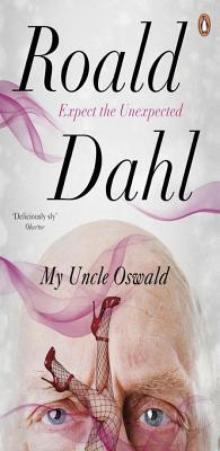 My Uncle Oswald
My Uncle Oswald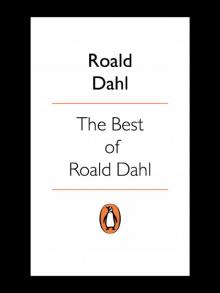 The Best of Roald Dahl
The Best of Roald Dahl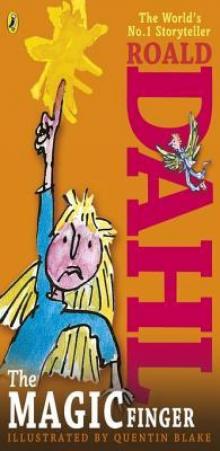 The Magic Finger
The Magic Finger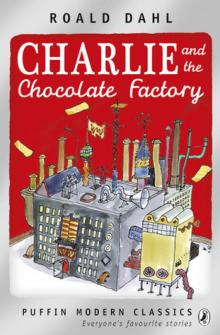 Charlie and the Chocolate Factory
Charlie and the Chocolate Factory Fantastic Mr Fox
Fantastic Mr Fox Matilda
Matilda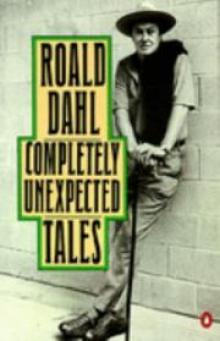 Completely Unexpected Tales: Tales of the Unexpected. More Tales of the Unexpected
Completely Unexpected Tales: Tales of the Unexpected. More Tales of the Unexpected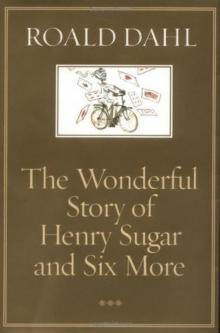 The Wonderful Story of Henry Sugar and Six More
The Wonderful Story of Henry Sugar and Six More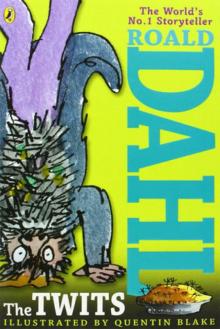 The Twits
The Twits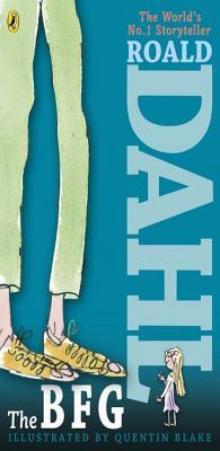 The BFG
The BFG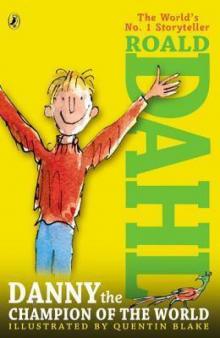 Danny the Champion of the World
Danny the Champion of the World The Witches
The Witches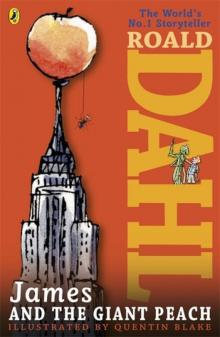 James and the Giant Peach
James and the Giant Peach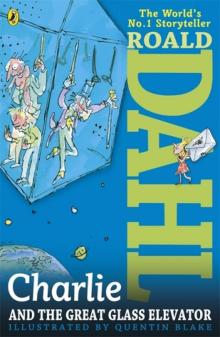 Charlie and the Great Glass Elevator
Charlie and the Great Glass Elevator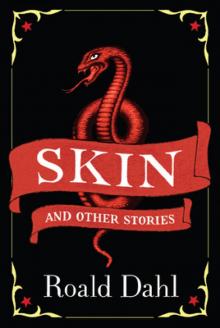 Skin and Other Stories
Skin and Other Stories Kiss Kiss
Kiss Kiss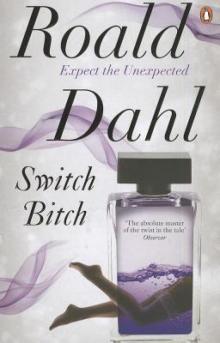 Switch Bitch
Switch Bitch The Giraffe and the Pelly and Me
The Giraffe and the Pelly and Me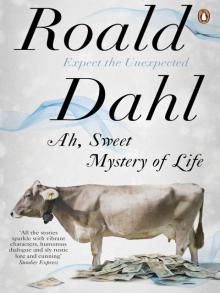 Ah, Sweet Mystery of Life
Ah, Sweet Mystery of Life Fear
Fear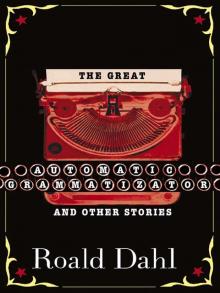 The Great Automatic Grammatizator and Other Stories
The Great Automatic Grammatizator and Other Stories Someone Like You
Someone Like You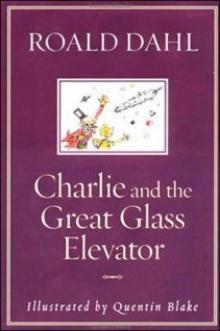 Charlie and the Great Glass Elevator c-2
Charlie and the Great Glass Elevator c-2 More About Boy
More About Boy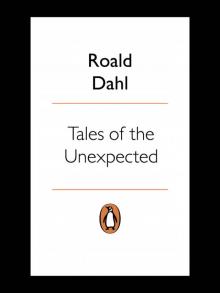 Tales of the Unexpected
Tales of the Unexpected The Umbrella Man and Other Stories
The Umbrella Man and Other Stories Dirty Beasts
Dirty Beasts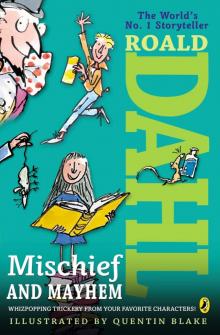 Roald Dahl's Mischief and Mayhem
Roald Dahl's Mischief and Mayhem The Collected Short Stories of Roald Dahl, Volume 1
The Collected Short Stories of Roald Dahl, Volume 1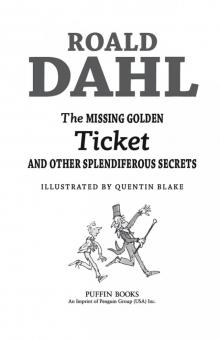 The Missing Golden Ticket and Other Splendiferous Secrets
The Missing Golden Ticket and Other Splendiferous Secrets Billy and the Minpins
Billy and the Minpins Over to You
Over to You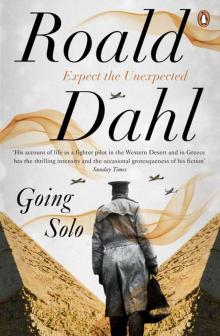 Going Solo
Going Solo Deception
Deception War
War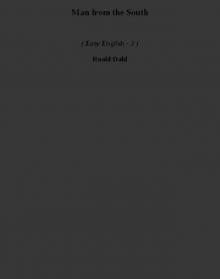 Man from the South ee-3
Man from the South ee-3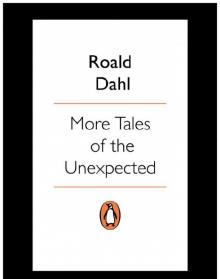 More Tales of the Unexpected
More Tales of the Unexpected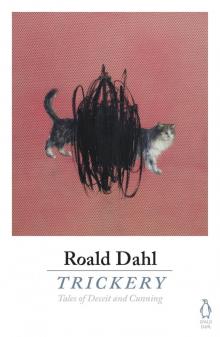 Trickery
Trickery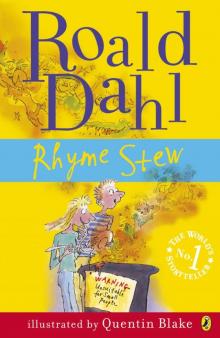 Rhyme Stew
Rhyme Stew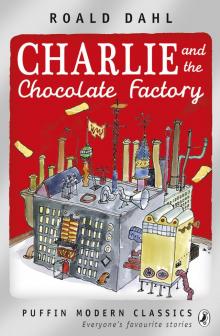 Charlie and the Chocolate Factory (Puffin Modern Classics relaunch)
Charlie and the Chocolate Factory (Puffin Modern Classics relaunch)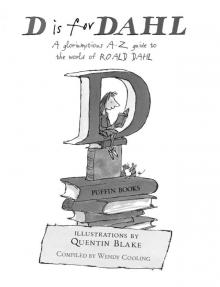 D is for Dahl
D is for Dahl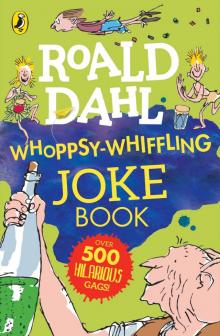 Roald Dahl Whoppsy-Whiffling Joke Book
Roald Dahl Whoppsy-Whiffling Joke Book Spotty Powder and other Splendiferous Secrets
Spotty Powder and other Splendiferous Secrets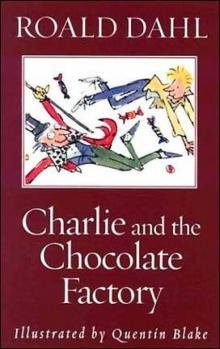 Charlie and the Chocolate Factory c-1
Charlie and the Chocolate Factory c-1 Boy
Boy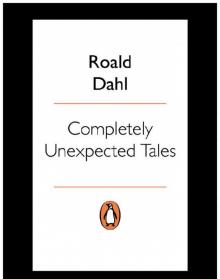 Completely Unexpected Tales
Completely Unexpected Tales Madness
Madness Innocence
Innocence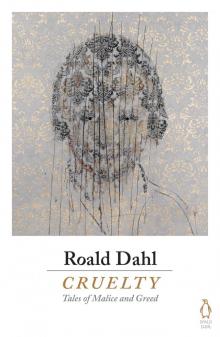 Cruelty
Cruelty George's Marvellous Medicine
George's Marvellous Medicine